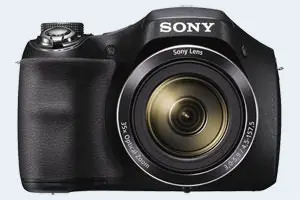Sony H300 vs RX100
The Sony Cyber-shot DSC-H300 and the Sony Cyber-shot DSC-RX100 are two digital cameras that were revealed to the public, respectively, in February 2014 and June 2012. Both the H300 and the RX100 are fixed lens compact cameras that are based on a 1/2.3-inch (H300) and an one-inch (RX100) sensor. The H300 has a resolution of 19.9 megapixels, whereas the RX100 provides 20 MP.
Below is an overview of the main specs of the two cameras as a starting point for the comparison.

Check H300 offers at
ebay.com

Check RX100 offers at
ebay.com
Going beyond this snapshot of core features and characteristics, what are the differences between the Sony Cyber-shot DSC-H300 and the Sony Cyber-shot DSC-RX100? Which one should you buy? Read on to find out how these two cameras compare with respect to their body size, their imaging sensors, their shooting features, their input-output connections, and their reception by expert reviewers.
Body comparison
An illustration of the physical size and weight of the Sony H300 and the Sony RX100 is provided in the side-by-side display below. The two cameras are presented according to their relative size. Three consecutive perspectives from the front, the top, and the back are available. All size dimensions are rounded to the nearest millimeter.
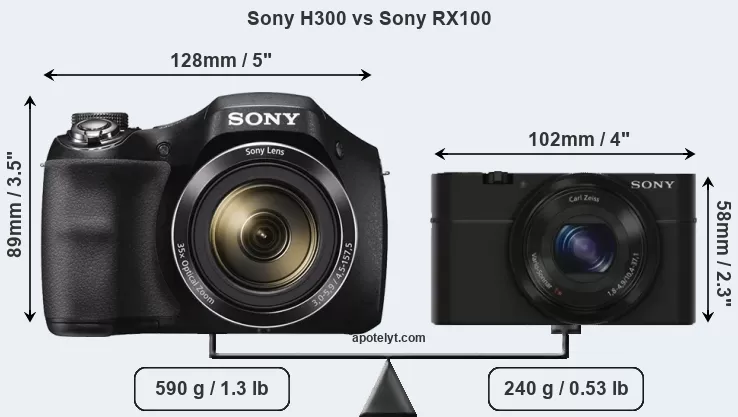
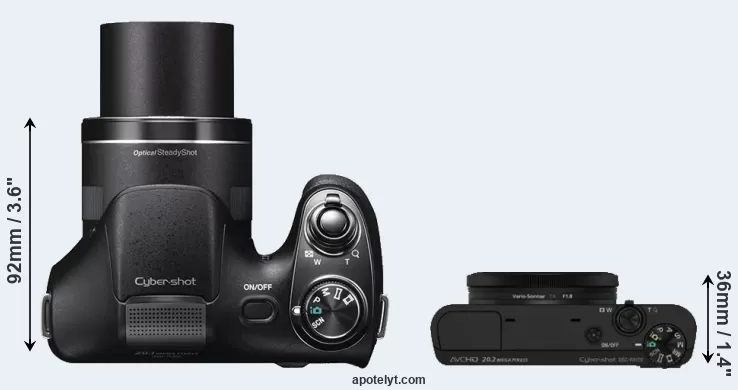
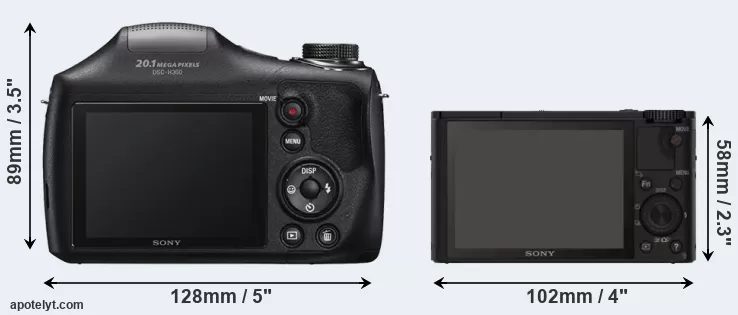
If the front view area (width x height) of the cameras is taken as an aggregate measure of their size, the Sony RX100 is considerably smaller (48 percent) than the Sony H300. Moreover, the RX100 is substantially lighter (59 percent) than the H300. In this context, it is worth noting that neither the H300 nor the RX100 are weather-sealed.
The power pack in the RX100 can be charged via the USB port, which can be very convenient when travelling.
The table below summarizes the key physical specs of the two cameras alongside a broader set of comparators. In case you want to display and compare another camera duo, you can use the CAM-parator app to select your camera combination among a large number of options.

| Camera Model |
Camera Width |
Camera Height |
Camera Depth |
Camera Weight |
Battery Life |
Weather Sealing |
Camera Launch |
Launch Price |
Street Price |
||
|---|---|---|---|---|---|---|---|---|---|---|---|
| 1. | Sony H300 | 128 mm | 89 mm | 92 mm | 590 g | 350 | n | Feb 2014 | EUR 219 | ebay.com | |
| 2. | Sony RX100 | 102 mm | 58 mm | 36 mm | 240 g | 330 | n | Jun 2012 | EUR 649 | ebay.com | |
| 3. | Canon SX610 | 105 mm | 61 mm | 27 mm | 191 g | 270 | n | Jan 2015 | EUR 249 | ebay.com | |
| 4. | Leica Q Typ 116 | 130 mm | 80 mm | 93 mm | 640 g | 300 | n | Jun 2015 | EUR 3 999 | ebay.com | |
| 5. | Sony A5100 | 110 mm | 63 mm | 36 mm | 283 g | 400 | n | Aug 2014 | EUR 499 | ebay.com | |
| 6. | Sony H200 | 123 mm | 83 mm | 87 mm | 530 g | 240 | n | Jan 2013 | EUR 249 | ebay.com | |
| 7. | Sony H400 | 130 mm | 95 mm | 122 mm | 628 g | 300 | n | Feb 2014 | EUR 319 | ebay.com | |
| 8. | Sony HX90V | 102 mm | 58 mm | 36 mm | 245 g | 360 | n | Apr 2015 | EUR 469 | ebay.com | |
| 9. | Sony HX400V | 130 mm | 93 mm | 103 mm | 660 g | 300 | n | Feb 2014 | EUR 499 | ebay.com | |
| 10. | Sony NEX-5N | 111 mm | 59 mm | 38 mm | 269 g | 460 | n | Aug 2011 | EUR 599 | ebay.com | |
| 11. | Sony NEX-5R | 111 mm | 59 mm | 39 mm | 276 g | 330 | n | Aug 2012 | EUR 699 | ebay.com | |
| 12. | Sony RX1R | 113 mm | 65 mm | 70 mm | 482 g | 270 | n | Jun 2013 | EUR 3 099 | ebay.com | |
| 13. | Sony RX1R II | 113 mm | 65 mm | 72 mm | 507 g | 220 | n | Oct 2015 | EUR 3 499 | ebay.com | |
| 14. | Sony RX100 II | 102 mm | 58 mm | 38 mm | 281 g | 350 | n | Jun 2013 | EUR 749 | ebay.com | |
| 15. | Sony RX100 III | 102 mm | 58 mm | 41 mm | 290 g | 320 | n | May 2014 | EUR 849 | ebay.com | |
| 16. | Sony RX100 IV | 102 mm | 58 mm | 41 mm | 298 g | 280 | n | Jun 2015 | EUR 1 149 | ebay.com | |
| Note: Measurements and pricing do not include easily detachable parts, such as add-on or interchangeable lenses or optional viewfinders. | |||||||||||
Any camera decision will obviously take relative prices into account. The listed launch prices provide an indication of the market segment that the manufacturer of the cameras have been targeting. The H300 was launched at a markedly lower price (by 66 percent) than the RX100, which puts it into a different market segment. Usually, retail prices stay at first close to the launch price, but after several months, discounts become available. Later in the product cycle and, in particular, when the replacement model is about to appear, further discounting and stock clearance sales often push the camera price considerably down. Then, after the new model is out, very good deals can frequently be found on the pre-owned market.
Sensor comparison
The imaging sensor is at the core of digital cameras and its size is one of the main determining factors of image quality. A large sensor will tend to have larger individual pixels that provide better low-light sensitivity, wider dynamic range, and richer color-depth than smaller pixel-units in a sensor of the same technological generation. Furthermore, a large sensor camera will give the photographer more possibilities to use shallow depth-of-field in order to isolate a subject from the background. On the downside, larger sensors tend to be more expensive and lead to bigger and heavier cameras and lenses.
Of the two cameras under consideration, the Sony H300 features a 1/2.3-inch sensor and the Sony RX100 an one-inch sensor. The sensor area in the RX100 is 314 percent bigger. As a result of these sensor size differences, the cameras have a format factor of, respectively, 5.6 and 2.7. The sensor in the H300 has a native 4:3 aspect ratio, while the one in the RX100 offers a 3:2 aspect.
Technology-wise, the RX100 uses a more advanced image processing engine (BIONZ X) than the H300 (BIONZ), with benefits for noise reduction, color accuracy, and processing speed.
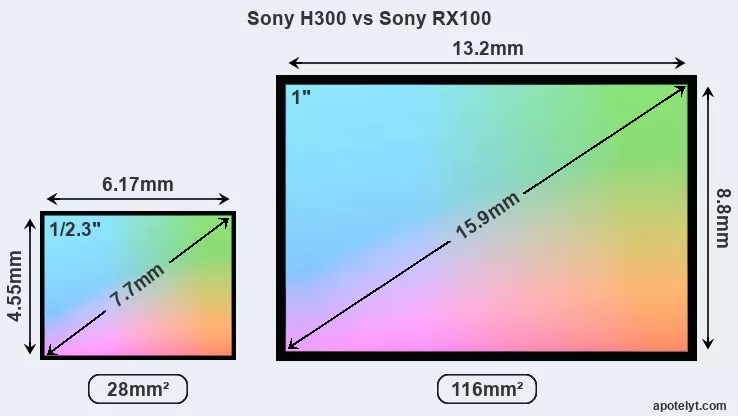
With 20MP, the RX100 offers a higher resolution than the H300 (19.9MP), but the RX100 nevertheless has larger individual pixels (pixel pitch of 2.41μm versus 1.19μm for the H300) due to its larger sensor. However, the H300 is a somewhat more recent model (by 1 year and 8 months) than the RX100, and its sensor might have benefitted from technological advances during this time that enhance the light gathering capacity of its pixel-units. Coming back to sensor resolution, it should be mentioned that the H300 has no anti-alias filter installed, so that it can capture all the detail its sensor resolves.
The Sony Cyber-shot DSC-H300 has a native sensitivity range from ISO 80 to ISO 3200. The corresponding ISO settings for the Sony Cyber-shot DSC-RX100 are ISO 100 to ISO 6400, with the possibility to increase the ISO range to 100-25600.
In terms of underlying technology, the H300 is build around a CCD sensor, while the RX100 uses a CMOS imager. Both cameras use a Bayer filter for capturing RGB colors on a square grid of photosensors. This arrangement is found in most digital cameras.
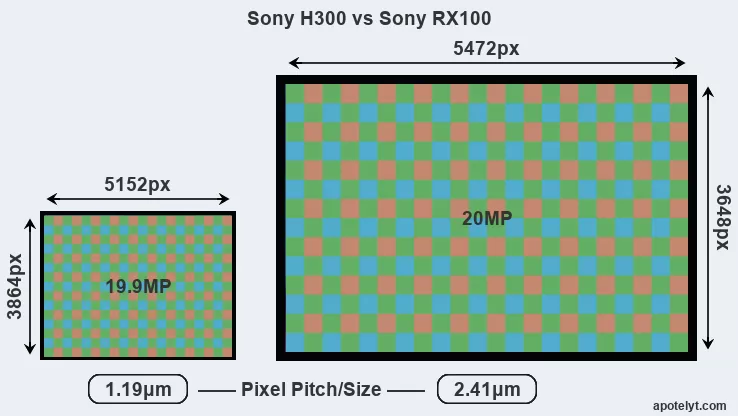
Since 2007, DXO Mark has published sensor performance measurements that have been derived using a consistent methodology. This service assesses and scores the color depth ("DXO Portrait"), dynamic range ("DXO Landscape"), and low-light sensitivity ("DXO Sports") of camera sensors, and also publishes an overall camera score. The adjacent table reports on the physical sensor characteristics and the outcomes of the DXO sensor quality tests for a sample of comparator-cameras.

| Camera Model |
Sensor Class |
Resolution (MP) |
Horiz. Pixels |
Vert. Pixels |
Video Format |
DXO Portrait |
DXO Landscape |
DXO Sports |
DXO Overall |
||
|---|---|---|---|---|---|---|---|---|---|---|---|
| 1. | Sony H300 | 1/2.3 | 19.9 | 5152 | 3864 | 720/30p | 20.1 | 11.4 | 630 | 45 | |
| 2. | Sony RX100 | 1-inch | 20.0 | 5472 | 3648 | 1080/60p | 22.6 | 12.4 | 390 | 66 | |
| 3. | Canon SX610 | 1/2.3 | 20.2 | 5184 | 3888 | 1080/30p | 20.2 | 11.6 | 712 | 47 | |
| 4. | Leica Q Typ 116 | Full Frame | 24.0 | 6000 | 4000 | 1080/60p | 24.3 | 12.7 | 2221 | 85 | |
| 5. | Sony A5100 | APS-C | 24.0 | 6000 | 4000 | 1080/60p | 23.8 | 12.7 | 1347 | 80 | |
| 6. | Sony H200 | 1/2.3 | 15.2 | 5184 | 2930 | 720/30p | 19.9 | 11.2 | 529 | 44 | |
| 7. | Sony H400 | 1/2.3 | 19.9 | 5152 | 3864 | 720/30p | 20.1 | 11.4 | 630 | 45 | |
| 8. | Sony HX90V | 1/2.3 | 18.0 | 4896 | 3672 | 1080/60p | 20.2 | 11.6 | 738 | 47 | |
| 9. | Sony HX400V | 1/2.3 | 20.2 | 5184 | 3888 | 1080/60p | 20.1 | 11.4 | 629 | 45 | |
| 10. | Sony NEX-5N | APS-C | 16.0 | 4912 | 3264 | 1080/60i | 23.6 | 12.7 | 1079 | 77 | |
| 11. | Sony NEX-5R | APS-C | 16.0 | 4912 | 3264 | 1080/60i | 23.7 | 13.1 | 910 | 78 | |
| 12. | Sony RX1R | Full Frame | 24.0 | 6000 | 4000 | 1080/60p | 25.0 | 13.6 | 2537 | 91 | |
| 13. | Sony RX1R II | Full Frame | 42.2 | 7952 | 5304 | 1080/60p | 25.8 | 13.9 | 3204 | 97 | |
| 14. | Sony RX100 II | 1-inch | 20.0 | 5472 | 3648 | 1080/60p | 22.5 | 12.4 | 483 | 67 | |
| 15. | Sony RX100 III | 1-inch | 20.0 | 5472 | 3648 | 1080/60p | 22.4 | 12.3 | 495 | 67 | |
| 16. | Sony RX100 IV | 1-inch | 20.0 | 5472 | 3648 | 4K/30p | 22.8 | 12.6 | 591 | 70 | |
| Note: DXO values in italics represent estimates based on sensor size and age. | |||||||||||
Many modern cameras are not only capable of taking still images, but can also record movies. Both cameras under consideration are equipped with sensors that have a sufficiently high read-out speed for moving images, but the RX100 provides a better video resolution than the H300. It can shoot movie footage at 1080/60p, while the H300 is limited to 720/30p.
Feature comparison
Beyond body and sensor, cameras can and do differ across a range of features. The H300 and the RX100 are similar in the sense that neither of the two has a viewfinder. The images are, thus, framed using live view on the rear LCD. The table below summarizes some of the other core capabilities of the Sony H300 and Sony RX100 in connection with corresponding information for a sample of similar cameras.

| Camera Model |
Viewfinder (Type or 000 dots) |
Control Panel (yes/no) |
LCD Specifications (inch/000 dots) |
LCD Attach- ment |
Touch Screen (yes/no) |
Max Shutter Speed * |
Max Shutter Flaps * |
Built-in Flash (yes/no) |
Built-in Image Stab |
||
|---|---|---|---|---|---|---|---|---|---|---|---|
| 1. | Sony H300 | none | n | 3.0 / 460 | fixed | n | 1/1500s | 0.8/s | Y | Y | |
| 2. | Sony RX100 | none | n | 3.0 / 1229 | fixed | n | 1/2000s | 10.0/s | Y | Y | |
| 3. | Canon SX610 | none | n | 3.0 / 922 | fixed | n | 1/2000s | 2.5/s | Y | Y | |
| 4. | Leica Q Typ 116 | 3680 | n | 3.0 / 1040 | fixed | Y | 1/2000s | 10.0/s | n | Y | |
| 5. | Sony A5100 | none | n | 3.0 / 922 | tilting | Y | 1/4000s | 6.0/s | Y | n | |
| 6. | Sony H200 | none | n | 3.0 / 460 | fixed | n | 1/1500s | 0.8/s | Y | Y | |
| 7. | Sony H400 | 210 | n | 3.0 / 460 | fixed | n | 1/2000s | 0.7/s | Y | Y | |
| 8. | Sony HX90V | 638 | n | 3.0 / 921 | tilting | n | 1/2000s | 10.0/s | Y | Y | |
| 9. | Sony HX400V | 210 | n | 3.0 / 921 | tilting | n | 1/4000s | 10.0/s | Y | Y | |
| 10. | Sony NEX-5N | optional | n | 3.0 / 920 | tilting | Y | 1/4000s | 10.0/s | n | n | |
| 11. | Sony NEX-5R | optional | n | 3.0 / 920 | tilting | Y | 1/4000s | 10.0/s | n | n | |
| 12. | Sony RX1R | optional | n | 3.0 / 1229 | fixed | n | 1/4000s | 5.0/s | Y | n | |
| 13. | Sony RX1R II | 2360 | n | 3.0 / 1229 | tilting | n | 1/4000s | 5.0/s | n | n | |
| 14. | Sony RX100 II | optional | n | 3.0 / 1229 | tilting | n | 1/2000s | 10.0/s | Y | Y | |
| 15. | Sony RX100 III | 1440 | n | 3.0 / 1229 | tilting | n | 1/2000s | 10.0/s | Y | Y | |
| 16. | Sony RX100 IV | 2359 | n | 3.0 / 1228 | tilting | n | 1/2000s | 16.0/s | Y | Y | |
| Note: *) Information refers to the mechanical shutter, unless the camera only has an electronic one. | |||||||||||
Both the H300 and the RX100 have zoom lenses built in. The H300 has a 25-875mm f/3.4-6.5 optic and the RX100 offers a 28-100mm f/1.8-4.9 (focal lengths in full frame equivalent terms). Hence, the H300 provides a wider angle of view at the short end, as well as more tele-photo reach at the long end than the RX100. The RX100 offers the faster maximum aperture.
Concerning the storage of imaging data, both the H300 and the RX100 write their files to SDXC or Memory Stick PRO Duo cards.
Connectivity comparison
For some imaging applications, the extent to which a camera can communicate with its environment can be an important aspect in the camera decision process. The table below provides an overview of the connectivity of the Sony Cyber-shot DSC-H300 and Sony Cyber-shot DSC-RX100 and, in particular, the interfaces the cameras (and selected comparators) provide for accessory control and data transfer.

| Camera Model |
Hotshoe Port |
Internal Mic / Speaker |
Microphone Port |
Headphone Port |
HDMI Port |
USB Port |
WiFi Support |
NFC Support |
Bluetooth Support |
||
|---|---|---|---|---|---|---|---|---|---|---|---|
| 1. | Sony H300 | - | mono / mono | - | - | micro | 2.0 | Y | - | - | |
| 2. | Sony RX100 | - | stereo / mono | - | - | micro | 2.0 | - | - | - | |
| 3. | Canon SX610 | - | - / - | - | - | micro | 2.0 | Y | Y | - | |
| 4. | Leica Q Typ 116 | Y | stereo / mono | - | - | micro | 2.0 | Y | Y | - | |
| 5. | Sony A5100 | - | stereo / mono | - | - | micro | 2.0 | Y | Y | - | |
| 6. | Sony H200 | - | mono / mono | - | - | - | 2.0 | - | - | - | |
| 7. | Sony H400 | - | mono / mono | - | - | micro | 2.0 | Y | - | - | |
| 8. | Sony HX90V | - | stereo / mono | - | - | micro | 2.0 | Y | Y | - | |
| 9. | Sony HX400V | Y | stereo / mono | - | - | micro | 2.0 | Y | Y | - | |
| 10. | Sony NEX-5N | Y | stereo / mono | - | - | mini | 2.0 | - | - | - | |
| 11. | Sony NEX-5R | Y | stereo / mono | - | - | mini | 2.0 | Y | - | - | |
| 12. | Sony RX1R | Y | stereo / mono | Y | - | mini | 2.0 | - | - | - | |
| 13. | Sony RX1R II | Y | stereo / mono | Y | - | micro | 2.0 | Y | Y | - | |
| 14. | Sony RX100 II | Y | stereo / mono | - | - | micro | 2.0 | Y | Y | - | |
| 15. | Sony RX100 III | - | stereo / mono | - | - | micro | 2.0 | Y | Y | - | |
| 16. | Sony RX100 IV | - | stereo / mono | - | - | micro | 2.0 | Y | Y | - |
It is notable that the H300 offers wifi support, while the RX100 does not. Wifi can be a very convenient means to transfer image data to an off-camera location.
Both the H300 and the RX100 have been discontinued, but can regularly be found used on ebay. The RX100 was replaced by the Sony RX100 II, while the H300 does not have a direct successor. Further information on the features and operation of the H300 and RX100 can be found, respectively, in the Sony H300 Manual (free pdf) or the online Sony RX100 Manual.
Review summary
So how do things add up? Is there a clear favorite between the Sony H300 and the Sony RX100? Which camera is better? A synthesis of the relative strong points of each of the models is listed below.
Advantages of the Sony Cyber-shot DSC-H300:
- Maximized detail: Lacks an anti-alias filter to exploit the sensor's full resolution potential.
- Wider view: Has a wider-angle lens that facilitates landscape or interior shots.
- More tele-reach: Has a longer tele-lens for perspective compression and subject magnification.
- Easier file upload: Has wifi built in for automatic backup or image transfer to the web.
- More affordable: Was introduced into a lower priced category (66 percent cheaper at launch).
- More modern: Is somewhat more recent (announced 1 year and 8 months after the RX100).
Reasons to prefer the Sony Cyber-shot DSC-RX100:
- Better moiré control: Has an anti-alias filter to avoid artificial patterns to appear in images.
- Better image quality: Features bigger pixels on a larger sensor for higher quality imaging.
- Richer colors: The pixel size advantage translates into images with better, more accurate colors.
- More dynamic range: Larger pixels capture a wider spectrum of light and dark details.
- Better low-light sensitivity: Larger pixels means good image quality even under poor lighting.
- Better jpgs: Has a more modern image processing engine (BIONZ X vs BIONZ).
- Better video: Provides higher definition movie capture (1080/60p vs 720/30p).
- More detailed LCD: Has a higher resolution rear screen (1229k vs 460k dots).
- Faster shutter: Has higher mechanical shutter speed (1/2000s vs 1/1500s) to freeze action.
- Faster burst: Shoots at higher frequency (10 vs 0.8 flaps/sec) to capture the decisive moment.
- Better light gathering: Has a lens with a wider maximum aperture (f/1.8 vs f/3.4).
- More compact: Is smaller (102x58mm vs 128x89mm) and will fit more readily into a bag.
- Less heavy: Has a lower weight (by 350g or 59 percent) and is thus easier to take along.
- Easier travel charging: Can be conveniently charged via its USB port.
- More heavily discounted: Has been on the market for longer (launched in June 2012).
If the count of relative strengths (bullet points above) is taken as a measure, the RX100 is the clear winner of the contest (15 : 6 points). However, the relative importance of the various individual camera aspects will vary according to personal preferences and needs, so that you might like to apply corresponding weights to the particular features before making a decision on a new camera. A professional wildlife photographer will view the differences between cameras in a way that diverges from the perspective of a family photog, and a person interested in architecture has distinct needs from a sports shooter. Hence, the decision which camera is best and worth buying is often a very personal one.
How about other alternatives? Do the specifications of the Sony H300 and the Sony RX100 place the cameras among the top in their class? Find out in the latest Best Superzoom Camera and Best Travel-Zoom Camera listings whether the two cameras rank among the cream of the crop.
In any case, while the comparison of technical specifications can provide a useful overview of the capabilities of different cameras, it says little about, for example, the shooting experience and imaging performance of the H300 and the RX100 in practical situations. User reviews, such as those found at amazon, can sometimes inform about these issues, but such feedback is often incomplete, inconsistent, and biased.
Expert reviews
This is where reviews by experts come in. The following table reports the overall ratings of the cameras as published by some of the major camera review sites (amateurphotographer [AP], cameralabs [CL], digitalcameraworld [DCW], dpreview [DPR], ephotozine [EPZ], photographyblog [PB]). As can be seen, the professional reviewers agree in many cases on the quality of different cameras, but sometimes their assessments diverge, reinforcing the earlier point that a camera decision is often a very personal choice.

| Camera Model |
AP score |
CL score |
DCW score |
DPR score |
EPZ score |
PB score |
Camera Launch |
Launch Price |
Street Price |
||
|---|---|---|---|---|---|---|---|---|---|---|---|
| 1. | Sony H300 | .. | + | .. | .. | 4.5/5 | 4/5 | Feb 2014 | EUR 219 | ebay.com | |
| 2. | Sony RX100 | 5/5 | + + | .. | 78/100 | 4/5 | 5/5 | Jun 2012 | EUR 649 | ebay.com | |
| 3. | Canon SX610 | .. | .. | .. | .. | 4/5 | 4/5 | Jan 2015 | EUR 249 | ebay.com | |
| 4. | Leica Q Typ 116 | 5/5 | .. | .. | 80/100 | 4.5/5 | 4.5/5 | Jun 2015 | EUR 3 999 | ebay.com | |
| 5. | Sony A5100 | 4.5/5 | + | .. | .. | 4.5/5 | 5/5 | Aug 2014 | EUR 499 | ebay.com | |
| 6. | Sony H200 | .. | .. | .. | .. | 3.5/5 | 3.5/5 | Jan 2013 | EUR 249 | ebay.com | |
| 7. | Sony H400 | .. | o | .. | .. | 3.5/5 | 3.5/5 | Feb 2014 | EUR 319 | ebay.com | |
| 8. | Sony HX90V | 4/5 | + + | .. | .. | 4/5 | 4.5/5 | Apr 2015 | EUR 469 | ebay.com | |
| 9. | Sony HX400V | 4/5 | + + | .. | .. | 4/5 | 4/5 | Feb 2014 | EUR 499 | ebay.com | |
| 10. | Sony NEX-5N | 3/5 | + + | .. | 79/100 | 4.5/5 | 4.5/5 | Aug 2011 | EUR 599 | ebay.com | |
| 11. | Sony NEX-5R | .. | .. | .. | .. | 4.5/5 | 4.5/5 | Aug 2012 | EUR 699 | ebay.com | |
| 12. | Sony RX1R | 5/5 | .. | .. | .. | 4/5 | 4.5/5 | Jun 2013 | EUR 3 099 | ebay.com | |
| 13. | Sony RX1R II | 5/5 | .. | .. | 82/100 | .. | 4.5/5 | Oct 2015 | EUR 3 499 | ebay.com | |
| 14. | Sony RX100 II | 5/5 | + + | .. | 79/100 | 4.5/5 | 4.5/5 | Jun 2013 | EUR 749 | ebay.com | |
| 15. | Sony RX100 III | 5/5 | + + | .. | 82/100 | 4.5/5 | 5/5 | May 2014 | EUR 849 | ebay.com | |
| 16. | Sony RX100 IV | 4.5/5 | + + | .. | 85/100 | 4/5 | 4.5/5 | Jun 2015 | EUR 1 149 | ebay.com | |
| Note: (+ +) highly recommended; (+) recommended; (o) reviewed; (..) not available. | |||||||||||
The above review scores should be interpreted with care, though. The assessments were made in relation to similar cameras of the same technological generation. Thus, a score needs to be put into the context of the launch date and the launch price of the camera, and comparisons of ratings among very different cameras or across long time periods have little meaning. Also, kindly note that some of the listed sites have over time developped their review approaches and their reporting style.

Check H300 offers at
ebay.com

Check RX100 offers at
ebay.com
Other camera comparisons
Did this review help to inform your camera decision process? In case you would like to check on the differences and similarities of other camera models, just make your choice using the following search menu. There is also a set of direct links to comparison reviews that other users of the CAM-parator app explored.
Specifications: Sony H300 vs Sony RX100
Below is a side-by-side comparison of the specs of the two cameras to facilitate a quick review of their differences and common features.
| Camera Model | Sony H300 | Sony RX100 |
|---|---|---|
| Camera Type | Fixed lens compact camera | Fixed lens compact camera |
| Camera Lens | 25-875mm f/3.4-6.5 | 28-100mm f/1.8-4.9 |
| Launch Date | February 2014 | June 2012 |
| Launch Price | USD 219 | USD 649 |
| Sensor Specs | Sony H300 | Sony RX100 |
| Sensor Technology | CCD | CMOS |
| Sensor Format | 1/2.3" Sensor | 1" Sensor |
| Sensor Size | 6.17 x 4.55 mm | 13.2 x 8.8 mm |
| Sensor Area | 28.0735 mm2 | 116.16 mm2 |
| Sensor Diagonal | 7.7 mm | 15.9 mm |
| Crop Factor | 5.6x | 2.7x |
| Sensor Resolution | 19.9 Megapixels | 20 Megapixels |
| Image Resolution | 5152 x 3864 pixels | 5472 x 3648 pixels |
| Pixel Pitch | 1.19 μm | 2.41 μm |
| Pixel Density | 70.91 MP/cm2 | 17.18 MP/cm2 |
| Moiré control | no AA filter | Anti-Alias filter |
| Movie Capability | 720/30p Video | 1080/60p Video |
| ISO Setting | 80 - 3,200 ISO | 100 - 6,400 ISO |
| ISO Boost | no Enhancement | 100 - 25,600 ISO |
| Image Processor | BIONZ | BIONZ X |
| DXO Sensor Quality (score) | .. | 66 |
| DXO Color Depth (bits) | .. | 22.6 |
| DXO Dynamic Range (EV) | .. | 12.4 |
| DXO Low Light (ISO) | .. | 390 |
| Screen Specs | Sony H300 | Sony RX100 |
| Viewfinder Type | no viewfinder | no viewfinder |
| LCD Framing | Live View | Live View |
| Rear LCD Size | 3.0inch | 3.0inch |
| LCD Resolution | 460k dots | 1229k dots |
| LCD Attachment | Fixed screen | Fixed screen |
| Shooting Specs | Sony H300 | Sony RX100 |
| Focus System | Contrast-detect AF | Contrast-detect AF |
| Manual Focusing Aid | no Peaking Feature | Focus Peaking |
| Max Shutter Speed (mechanical) | 1/1500s | 1/2000s |
| Continuous Shooting | 0.8 shutter flaps/s | 10 shutter flaps/s |
| Fill Flash | Built-in Flash | Built-in Flash |
| Storage Medium | MS or SDXC cards | MS or SDXC cards |
| Single or Dual Card Slots | Single card slot | Single card slot |
| UHS card support | no | no |
| Connectivity Specs | Sony H300 | Sony RX100 |
| External Flash | no Hotshoe | no Hotshoe |
| USB Connector | USB 2.0 | USB 2.0 |
| HDMI Port | micro HDMI | micro HDMI |
| Wifi Support | Wifi built-in | no Wifi |
| Body Specs | Sony H300 | Sony RX100 |
| Battery Type | Sony 4xAA | Sony NP-BX1 |
| Battery Life (CIPA) | 350 shots per charge | 330 shots per charge |
| In-Camera Charging | no USB charging | USB charging |
| Body Dimensions |
128 x 89 x 92 mm (5.0 x 3.5 x 3.6 in) |
102 x 58 x 36 mm (4.0 x 2.3 x 1.4 in) |
| Camera Weight | 590 g (20.8 oz) | 240 g (8.5 oz) |

Check H300 offers at
ebay.com

Check RX100 offers at
ebay.com
Did you notice an error on this page? If so, please get in touch, so that we can correct the information.
